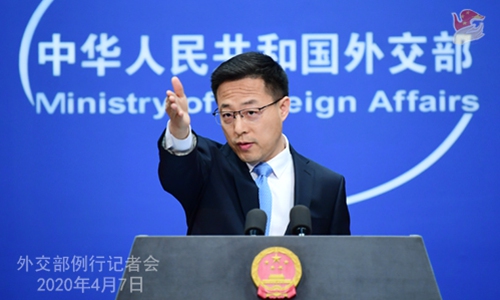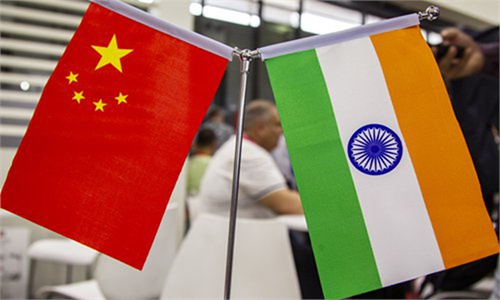
Foreign ministry spokesperson Zhao Lijian is making remarks at a press briefing on April 7. Photo: Ministry of Foreign Affairs
In a countermeasure against US visa restrictions on some Chinese officials over Tibet, China announced on Wednesday to restrict visas for US personnel who have acted maliciously regarding Tibet-related affairs.
The announcement was made by Zhao Lijian, spokesperson of China's Ministry of Foreign Affairs.
He urged the US to stop taking advantage of the Tibet issue to interfere with China's domestic affairs, and not go further down the wrong path and deal a further blow to China-US cooperation.
US Secretary of State Mike Pompeo, citing what he called human rights abuses by the Chinese government in Tibet, said on Tuesday the US would restrict visas for some Chinese officials, as Beijing obstructs travel to the region by US diplomats, journalists and tourists.
Analysts said the US visa restrictions are a low-budget attempt by the Trump administration to play the "China card" in order to gain support during his re-election year. Experts suspect that the US sudden reference to the Tibet issue is also aimed at launching an all-round crackdown on China.
Since January, Washington has intensified its interference in China's affairs, ranging from the Taiwan question to recent Hong Kong issues. The only one missing is Tibet, and now they want to launch an all-round crackdown on China, Zhang Tengjun, an assistant research fellow at the China Institute of International Studies, told the Global Times.
Experts said this will do no significant harm to China and is nothing more than US intimidation.
Zhang pointed the slew of those measures are also low-budget show for the Trump administration to win votes during election year, as most of his voters are conservative and hold a tough stance on China-related issues."
According to Pompeo, "access to Tibetan areas is increasingly vital to regional stability, given the PRC's human rights abuses there, as well as Beijing's failure to prevent environmental degradation near the headwaters of Asia's major rivers."
Simply based on Pompeo's baseless accusation, we can see that the US does not care about the interests of the Tibetan people or the region at all, otherwise they would not turn a blind eye to the rapid development of what used to be the least developed region in China, and how greatly people's lives have been improved, Zhu Weiqun, former head of the Ethnic and Religious Affairs Committee of the National Committee of the Chinese People's Political Consultative Conference, told the Global Times.
Since 2013, some 710,000 people have been lifted out of poverty in Tibet. The region's poverty rate has dropped from 35.2 percent in 2012 to less than 6 percent in 2018, according to a white paper released by the Chinese government in 2019.
Another report released by the Tibetan regional department of ecology and environment shows that the region remains one of the areas with the best environmental quality globally, with stable local biodiversity and ecosystems in 2019.
Li Haidong, a professor at the Institute of International Relations at China Foreign Affairs University, said that the US' China-policy team has now descended into a "morbid" state in which they are obsessed with a blatant crackdown on China to achieve certain political goals.
"This is a tragedy for the US. Washington should adopt practical policies on China. There is too much indulgence in an extreme and emotional ideological Cold War with China, which has finally propelled the US to go to extremes."


